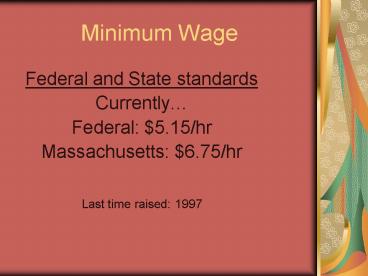Minimum Wage - PowerPoint PPT Presentation
1 / 6
Title:
Minimum Wage
Description:
... be increasing the minimum wage for the first time since 1997. ... Center for Policy Analysis claim that increases of 10% in the minimum wage may ... – PowerPoint PPT presentation
Number of Views:506
Avg rating:3.0/5.0
Title: Minimum Wage
1
Minimum Wage
- Federal and State standards
- Currently
- Federal 5.15/hr
- Massachusetts 6.75/hr
- Last time raised 1997
2
Raising Min. Wage
- For
- Helps low-skilled laborers support families and
selves
- Against
- Will hurt the economy by
- forcing small businesses to close
- companies to lay off workers
- prices to increase for consumers
3
Election 2006
Twenty-two states plus the District of Columbia
have minimum wages above the federal rate,
covering 58 of the nations labor force.
(Economic Policy Institute 2006)
4
The Debate Rages On
- On Tuesday, voters in six other states are
considering raising the minimum wage, all of
which would index minimum wage to inflation as do
Oregon, Washington, Florida and, beginning in
2007, Vermont.
- If Democrats succeed in retaking one or both
houses of Congress next week, a top priority will
be increasing the minimum wage for the first time
since 1997.
Economic research is also controversial Over 650
economists, recently signed a statement stating
that federal and state minimum wage increases
can significantly improve the lives of
low-income workers and their families, without
the adverse effects that critics have claimed
(EPI 2006). National Center for Policy Analysis
claim that increases of 10 in the minimum wage
may reduce demand hours worked at the minimum
wage by around 1 or 2 depending on
circumstances.
5
Universal Health CareAn unhealthy indecisiveness
- The World Health Organization (WHO) has ranked
the U.S. health care system 37th in the world for
quality and 55th for fairness and the United
States is the only industrialized country that
does not have universal health care. - Currently, health care is provided by private
companies or Medicare. HMO Health Maintenance
Org, PPO Preferred Provider Org. - Case study California recently sent a bill
through State Senate and House for single-payer
universal health care but Governator Ah-nold
vetoed it, calling it socialized medicine
6
Arguments- Pro and Con
- YES! UHC rocks!
- Ensuring the health of all citizens benefits a
nation economically - Provides coverage to all citizens regardless of
ability to pay - Health care increasingly unaffordable for
businesses and individuals - Universal health care would provide for
uninsured adults who may forgo treatment needed
for chronic health conditions.
- NO! Nix on UHC!
- Government-mandated health care would lower
quality of service - Must be funded with higher taxes and/or
spending cuts in other areas - A long, painful transition will have to take
place involving lost insurance industry jobs,
business closures, and new patient record
creation. - Like social security, any government benefit
eventually is taken as a "right" by the public,
meaning that it's politically near impossible to
remove or curtail it later on when costs get out
of control.































